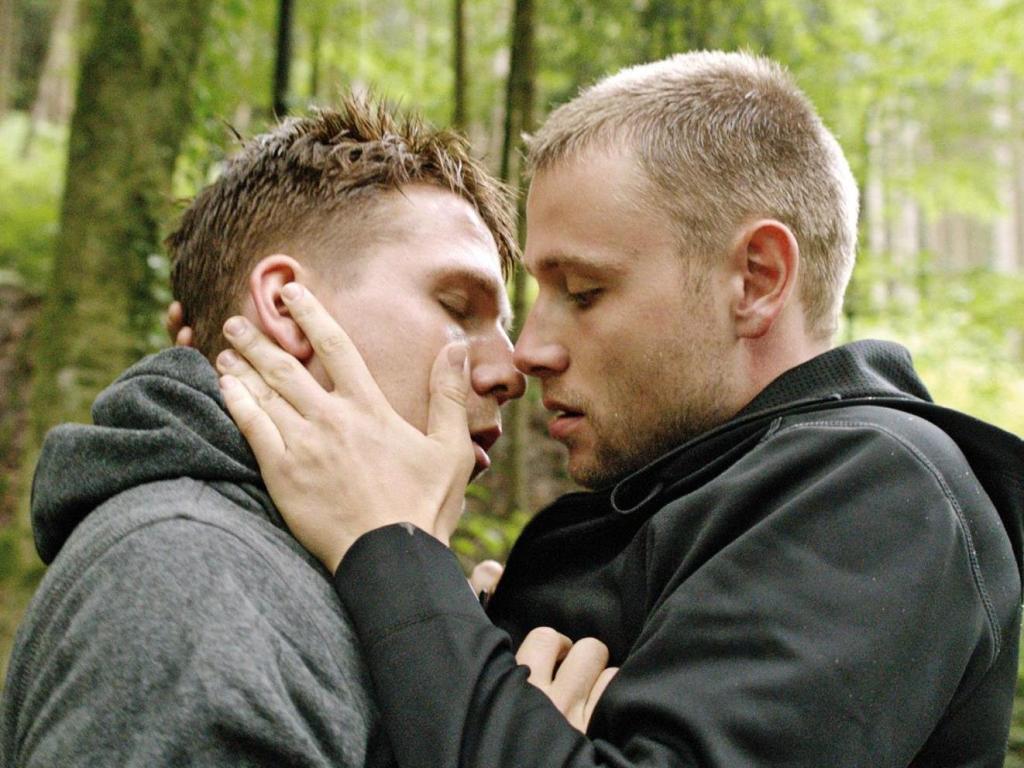In its on-screen story, Free Fall (Freier Fall) offers a chronicle of perfect composure collapsing under the weight of change; in its off-screen construction, the film accumulates familiar parts into a resilient and finessed whole. Its lead character, Marc Borgmann, (Hanno Koffler, If Not Us, Who?) deviates from the idyll and struggles with the consequences. Its writer/director, Stephan Lacant, (Fireflies) embraces the expected and reaps the benefits. Neither the in-narrative divergence from the norm, nor the over-arching structural conformity is to the feature’s detriment. The tale and themes of the German effort have been done before, but the filmmaker ensures the pertinence and poignancy of his offering.
A police officer with a burgeoning career, a beautiful wife (Katharina Schüttler, TV’s Generation War), and a baby on the way, Marc’s life faithfully follows a happily ordinary course until he meets Kay (Max Riemelt, Forgotten). Crossing paths at a training camp, quite literally through their shared penchant for jogging, their initial animosity grows into affinity and then affection, the resulting passionate pairing an unanticipated development. Though everything Marc has worked for – both professionally and personally – is at stake in his dalliances with Kay, their blossoming bond can’t easily be broken.
In an effort assembled with technical competence, most notably in the beautifully observant and fluid camerawork of cinematographer Sten Mende (Summer Outside), the difficulties of forbidden love play out as projected, perpetuated by the usual pointers of secretive glances, stolen moments and mounting suspicions. Torn as he is between duty and desire, his quandary is a classic morality tale: how can Marc balance his conventional and clandestine relationships? In pondering this problem, Lacant and co-writer Karsten Dahlem may retain the formula of the feature’s ilk; however the instances that comprise their story are nuanced and nimble. While recalling a host of other, similar films, the feature is reliant upon deeds and actions over overt expressions and dialogue.
Indeed, as Free Fall considers the struggle with sexuality that plagues its protagonist, particularly within the restrictions of a hyper-masculine environment such as the police force, it is its quiet contemplation that makes it mark. Attitudes, including the institutionalised reinforcement of socially accepted standards, are probed with perception and precision. Reactions to Marc and Kay’s affair – both from Marc himself as the repercussions slide into focus, and within his disapproving, interfering family – attempt to dissect the complex range of responses within a community outwardly tolerant, but are still littered with festering confusion. Though its obedience to narrative expectation is apparent, the film’s straightforward nature cannot be confused for simplicity.
Attuned, chemistry-fuelled performances enhance the needed air of tension and imbue the requisite emotion; once more, their effectiveness is a sign of assurance, not of ease. Riemelt may fare better in a more sympathetic role, but Borgmann conveys the many shades of his conflicted character with compelling dignity. Again and again, Free Fall’s components adhere to its confines, but its continued use of prescribed elements affords tenderness and thoughtfulness, while subtly testing its limits. The end result may not transcend type, but it does immerse and engage in an ever-relevant and involving feature.
Rating: 3 ½ out of 5 stars
Free Fall (Freier Fall)
Director: Stephan Lacant
Germany, 20132, 100 mins
Mardi Gras Film Festival
www.queerscreen.org.au
13 – 23 February
Melbourne Queer Film Festival
www.mqff.com.au
13 – 24 March
Brisbane Queer Film Festival
www.bqff.com.au
28 March – April 3





